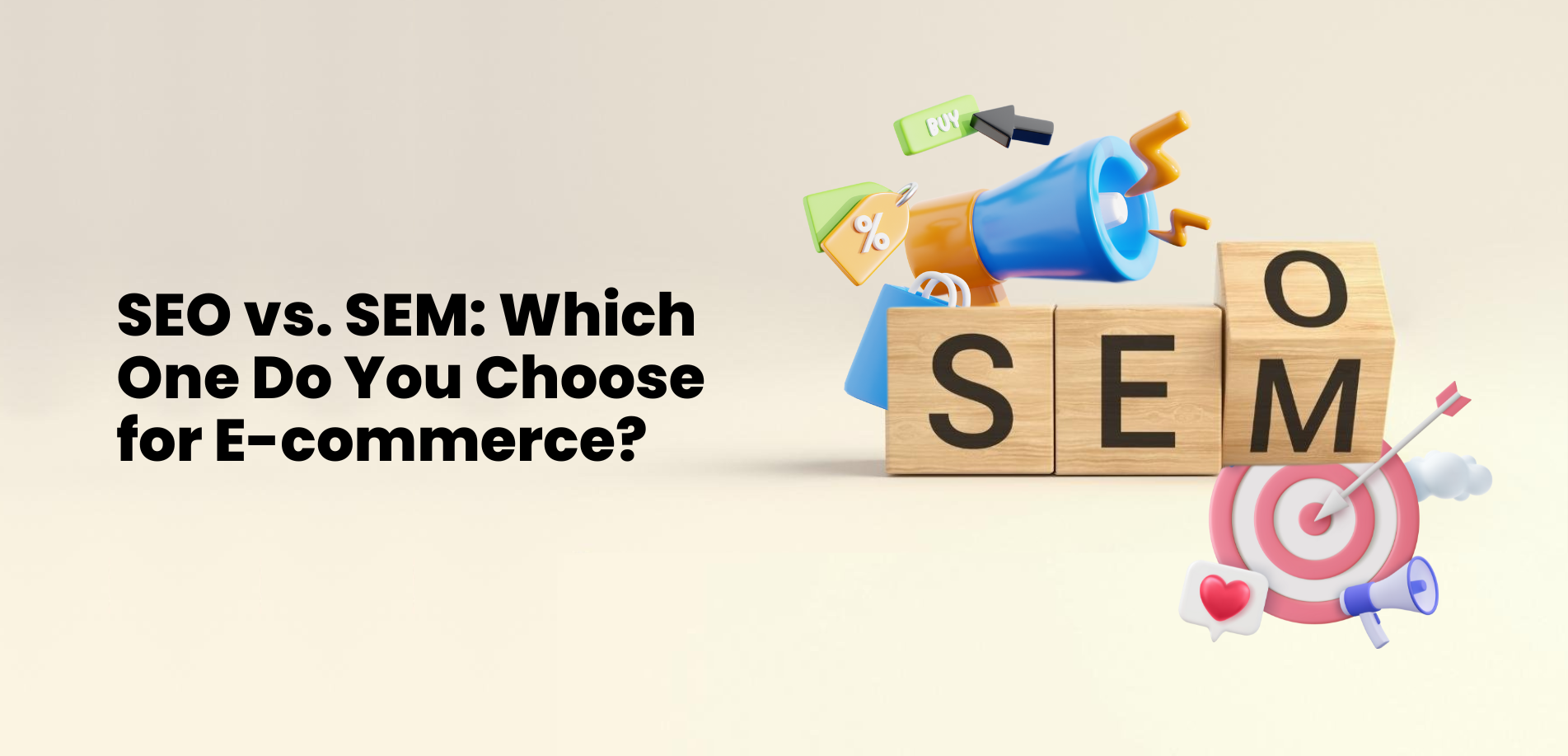SEO vs. SEM: Which One Do You Choose for E-commerce?
The battle between SEO and SEM has been a longstanding dilemma for businesses seeking online prominence. As the digital landscape evolves, it becomes crucial for e-commerce entities to discern the nuances of these two vital strategies: Search Engine Optimisation (SEO) and Search Engine Marketing (SEM).
This blog delves into the intricacies of SEM and SEO for e-commerce, comparing their pros and cons, and providing insights into crafting a balanced strategy for sustainable success.
Contents
Benefits of SEO for E-commerce
You expend resources once and reap benefits forever.
Investing in SEO is akin to planting seeds that grow into a resilient tree. While the initial efforts may be intensive, the long-term benefits are exponential. Once your e-commerce site attains a favourable position in organic search results, the dividends continue to flow without the need for constant financial input.
Formidable competitive advantage.
Success in SEO per e-commerce isn’t easily replicable. Achieving and maintaining a high organic ranking provides a substantial competitive advantage. E-commerce businesses that secure a strong SEO foundation stand out in a crowded digital marketplace, gaining trust and loyalty from discerning consumers.
Inherently poor SEO for e-commerce.
E-commerce websites often suffer from inherent SEO challenges. This provides an opportunity for diligent SEO efforts to yield substantial results with relatively modest investments. Even minor optimisations can lead to significant improvements in visibility and traffic.
Credibility of organic results.
Users are becoming more discerning, distinguishing between organic results and paid advertisements. Organic results are perceived as more credible and trustworthy. Establishing a strong organic presence enhances your brand’s credibility, fostering trust among potential customers.
Cost-effectiveness in the long run.
While the upfront costs of SEO may seem daunting, the long-term benefits make it a cost-effective strategy. The cost per visitor tends to decrease over time, becoming a fraction of what you might spend on continuous SEM campaigns.
SEM: Instant Gratification with Measurable ROI
Instant results with SEM.
SEM campaigns provide instant gratification. Unlike SEO, which requires time to show results, SEM can start delivering traffic to your e-commerce site from the moment the campaign is launched. This immediacy is particularly beneficial for new businesses seeking quick visibility.
Measurable ROI
One of the key advantages of SEM for online stores is its measurability. E-commerce businesses can precisely track their return on investment, allowing for informed decision-making. This transparency ensures that every dollar spent can be accounted for in terms of tangible outcomes.
SEM adapts to algorithm changes.
Search engine algorithms are constantly evolving. With SEM, your investment is not at the mercy of algorithm changes. While SEO strategies may require adjustments when algorithms are tweaked, SEM campaigns remain effective, providing a stable and adaptable marketing avenue.
Scalability and control
SEM allows for easy scalability. Once you identify a winning formula, you can scale up your SEM strategy effortlessly. This flexibility and control empower e-commerce businesses to adapt their campaigns based on performance metrics, ensuring optimal resource allocation.
PPC traffic converts better
In many instances, e-commerce businesses observe that PPC traffic from SEM campaigns converts better than organic search traffic. This higher conversion rate can lead to more immediate revenue generation, particularly for products or services with a time-sensitive appeal.
Brand control in SEM
SEM provides control over how your brand is presented. From ad copy to positioning, e-commerce businesses can tailor their brand message and attributes in a way that aligns with their marketing objectives. This level of control is crucial for shaping brand perception in the digital landscape.
Which One Is Best for E-commerce?
The pros and cons highlighted above underscore the complexity of choosing between SEO and SEM for e-commerce success. Striking the right balance is key to maximising the benefits of both strategies. Here are some strategic considerations:
New E-commerce Websites Prioritise SEM
For a budding e-commerce site, relying on the gradual success of SEO might not be a viable option. It is advisable to allocate a predominant share, approximately 90%, of resources to SEM initiatives. This strategic emphasis on SEM ensures prompt visibility and traffic, establishing a foundation that paves the way for subsequent seo efforts. This approach acknowledges the urgency of establishing a swift online presence for a new e-commerce platform, leveraging SEM’s immediate impact to create a robust groundwork that can later be complemented and fortified by the longer-term benefits of SEO.
Gradual Shift Towards SEO
As your e-commerce site gains traction and experiences SEO success, consider gradually reallocating resources towards SEO. This balanced approach allows you to benefit from both instant results and long-term organic growth.
Continuous Reliance on Paid Traffic
Given the ever-evolving nature of e-commerce and the need to promote products or services “right now,” a perpetual reliance on paid traffic is inevitable. Even as SEO gains prominence, maintaining a 50-50 spend on SEO and SEM activities in the long run is a prudent strategy.
Conclusion:
The choice between SEO and SEM for e-commerce is not binary but rather a dynamic decision that evolves with the lifecycle of your business. By strategically blending the benefits of both approaches, e-commerce entities can navigate the digital landscape, achieving sustainable growth and maintaining a competitive edge. As the algorithms change and consumer behaviours evolve, adapting your strategy to leverage the strengths of both SEO and SEM ensures a resilient and successful e-commerce presence.








